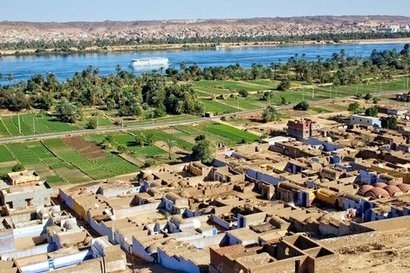
The collaborative project, lasting two years, will see academics from the world-leading Energy 2050 Institute partner with Egyptian experts to develop a system that could provide fresh and safe water to poor and rural communities. Egypt’s growing population and scarcity of water resources means that freshwater supplies are becoming increasingly stressed. Desalination technologies, which produce drinkable water from seawater, offer an alternative source of water but at a high energy cost. Renewable solar energy has been used extensively in these technologies but is not consistent due to not enough sunlight on cloudy days and at night.
A hybrid system using biogas and solar is an entirely new technology with only a handful of studies being attempted so far. There are several options for the integration of the hybrid energy system and the desalination process and the process will explore both thermal and electrically based freshwater production systems.
The collaborative team will investigate whether biogas produced from biological matter - such as cattle manure - could be used as a feasible backup to solar. At the same time, the team will find the optimum way of integrating the two technologies to maximise fresh water production.
The project will involve a survey of biogas resources in Egypt, a model-based design and optimisation of the hybrid desalination system and will investigate the operational strategies to ensure cost-effective and reliable drinking water supply to rural communities. The team hope that the hybridisation of biogas and solar energy sources will lead to more reliable and flexible energy production but also will be cheaper than using a single renewable energy technology alone, given that both biomass and solar energy are in abundance in Egypt.
“The first part of the project will see us look at how to maximise fresh water production at the lowest cost” said Dr Mark Walker, Research Associate at Energy 2050. “We’ll also be investigating how different wastes can help us to produce the most energy to supply the system. Our project could provide continuous production of fresh water to rural areas, at a low cost and smaller carbon footprint than current technologies.”
Dr Mohamed Hammam, Assistant Professor at Port Said University, added that the project is important from many perspectives. Beside the technological and economical benefits, it allows researchers from two institutes with famous experience in the field of renewable energy and combustion to work closely together.
A pilot demonstration system will be built in Egypt and will be monitored by the joint UK/Egyptian team to assess its performance. The team hope to install integrated desalination systems in poor and rural communities of Egypt like Sinai, Nile-Delta and Upper Egypt.
The project has been funded by two programmes: the British Council’s Newton Fund Institutional Links programme which helps UK institutions build strong and sustainable relationships and helps to promote economic development and social welfare of partner countries, and Science and Technology Development Fund in Egypt (STDF), the main organisation of funding research and development projects of Egyptian universities and research institutes.
Image: Energy 2050
For additional information:

